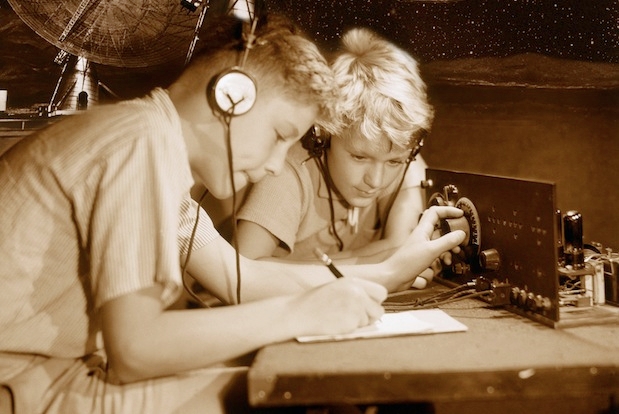Much praise has been lavished on Radio 2’s 500 Words short-story competition, the winners to be announced on Friday’s Chris Evans show, live from the Hay Festival. Quite right, too. It’s a brilliant way to encourage children aged 13 and under to explore their potential by inviting them to write stories. But you’d think that since it’s a competition organised by a radio station the prizes might have something to do with listening, the making of programmes, the sheer magic of radio. Not so. The winners will receive a huge pile of books for themselves, and another pile for their school library. But there’s nothing to celebrate the connection between radio and the imagination; nothing to encourage children to take up the radio habit.
In our tech-crazed, high-speed world, listening has been pushed on to the back seat. Yet listening is crucial to learning, whether you’re nine and discovering the world, or 39 and responsible for teamwork in the office or high-level diplomatic negotiations. Without knowing how to listen, to really focus on what’s being said, much is lost. Radio is one way to discover how to do it. But how many children and teenagers do you know who listen to the radio (by which I mean speech radio)? My teenage nephews who were keen have grown out of it; the nieces have never been addicts.
This is hardly surprising when so few programmes are designed for the younger audience. With toddlers now growing up with iPads tied to their bibs, the world of the child has become visual and virtual. 500 Words could have been an opportunity to show them that radio actually is rather cool, with its awesome ability to time travel, to take us places in ways that feel so real, to lose ourselves in another’s pulse.
Radio 4’s Archive on 4 on Saturday was an unlikely place to find a children’s champion. The Benjamin Broadcasts, presented by the children’s writer and broadcaster Michael Rosen (and produced by Kate Schneider), took us to Berlin in the late 1920s and to some pioneering radio scripts for children written by the German writer and philosopher Walter (The Arcades Project) Benjamin. ‘Have you ever watched a pharmacist make up a prescription?’ Benjamin began one programme. ‘On a scale with very delicate weights, ounce by ounce, dram by dram, he weighs all the substances and specks that make up the final powder’ (we are in 1920s Berlin, remember). ‘This is how I feel when I tell you something over the radio. My weights are the minutes. Very carefully I must weigh how much of this and how much of that so the mixture’s just right.’
Benjamin made several series of 20-minute programmes for the ‘Youth Hour’ on Germany’s first state broadcasting station between 1929 and 1932. He doesn’t just tell his young listeners about historical events (witchcraft in the Middle Ages), natural disasters (the Mississippi floods), or take them on a tour of a mammoth locomotive works. He invites his young listeners to have their own opinions, suggesting, ‘You must now explain this to your parents,’ or ‘You must now be thinking’ — creating an interactive experience long before the internet.
He doesn’t want his audience to be passive listeners; he wants them to be an active part of what’s going on in the ether. As Rosen explained, Benjamin doesn’t feed information to his listeners but rather asks them to get involved in an exercise which will teach them how to learn, how to see, how to question, how to engage. Listening to these programmes is not just entertainment; it’s also a way of understanding the world.
None of the recorded programmes has survived, only the scripts, by a fluke that saw them taken from Benjamin’s Paris flat by the German occupying army and brought back to Berlin, where they were eventually seized by Soviet troops after 1945. They were then given back to Germany by the Soviets in 1957, and are now housed in a special archive where many of them have been translated into English. (We heard snippets from them brilliantly recreated by Henry Goodman.) Benjamin himself committed suicide in September 1940 while trapped on the border between France and Spain with a group of refugees, believing they would be handed over to the Gestapo the next day. (The border in fact was opened the next day and the other refugees escaped.)
Perhaps Benjamin’s cleverest programme is called ‘The Thinking Game’, which was broadcast in Frankfurt in July 1932. He asks his listeners to take a pencil and a piece of paper and make a dash whenever they hear a mistake in the story he is about to tell. You should end up with 15 dashes, he tells them, ‘but if you find only five or six that’s perfectly all right as well’. He challenges and teases his listeners, says Rosen, understanding so well ‘the subversive potential’ of radio. Benjamin’s aim was to reach out to 12- to 14-year-olds. Just the age that the BBC needs to draw in if speech radio as we know it is to survive.






Comments